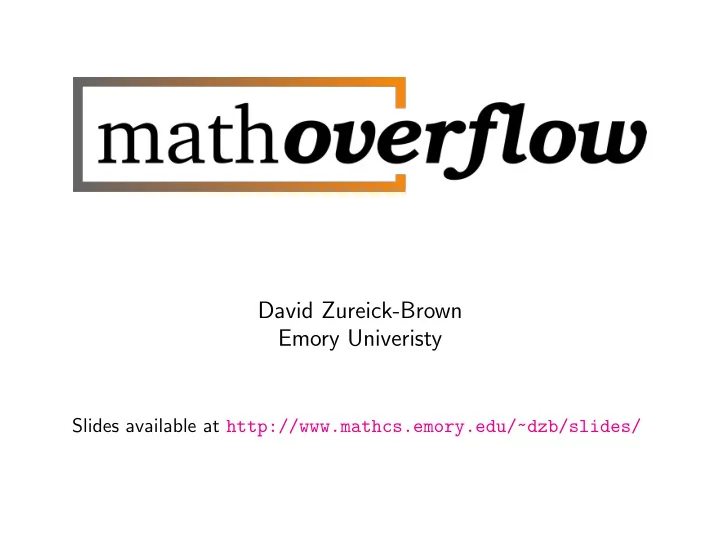

David Zureick-Brown Emory Univeristy Slides available at http://www.mathcs.emory.edu/~dzb/slides/
Introduction internet preprint servers New technologies are mailing lists changing the way we do newsgroups maths research. email online databases collaborative editing world wide web Many of these technologies are internet-based. waves? wikis search engines feed aggregators blogs
Introduction
Mathematical collective consciousness “I assume everybody has dreams about organizing and sharing everything they ever think of, or of how great it would be if everybody in your field shared a big brain like the borg” – Anton Geraschenko
Massively collaborative mathematics – Polymath
Stacks Project
Motivation: math on the internet was getting buried!
Introduction
About the site Created in October, 2009 (2 Berkeley grad students, 1 postdoc) Draws questions and advice from each extreme – Fields medalists and gifted high school students (Sanitized) database dumps are publicly available, fun to grep for statistics of site usage
Fun facts 35000 questions, 60000 answers, at least 10000 ‘active’ users; Time before getting an answer: Average: 4.40 hours Median: 1.75, Standard deviation: 5.70 Time before getting an ‘accepted’ answer: Average: 5.39 hours Median : 2.61 Standard Deviation: 6.16
MO in action
MO in action
About the site – features Badges - mostly exist to reward exploring the site and figuring out how to do everything; Reputation - gain more ability to use site; Big boon – the community is self moderating ; Wiki effect – edit others’ answers;
Reputation Things you get to do with a little reputation: Up-voting Down-voting Ability to leave comments
Reputation Things you get to do with a lot of reputation “Moderator” privileges (e.g., “vote to close” a bad question) retag questions edit posts edit answers
About the site – features Easy to cut through the clutter : Tags Watched Avoided RSS (for questions, users, tags, etc.)
Introduction
About the site - quote from Anton “One thing that I like to point out in conversation about MO is that putting a question or answer out there without posing it towards some specific person often leads to meaningful interactions with awesome people. Some people start collaborations based on MO questions, but even if you don’t, you get to know a lot of people pretty well, which feels great. Also, there is something about interacting with famous people on MO that humanizes my internal representation of them.” – Anton Geraschenko
Typical questions Specific mathematical questions Research oriented Idle (e.g., “Is this theorem still true if I weaken hypothesis X’?”) Historical questions Reference requests “What’s the point of...?” Career advice Crowdsourcing typos Gossip (discouraged)
MO – keeping current “I started reading mathoverflow a few months ago, and currently for me it is by far the best online way to find out about current events in math research (at least in my area – number theory). It’s just stunning the number of new results and links to key papers I’ve found on mathoverflow.” – William Stein (Mathematician, creator of SAGE)
Why successful for pure mathematics? “Using MathOverflow should be an extension of the way you normally do mathematics, and the same rules you use to effectively solve problems can be used to make good MO questions. Just like solving problems, crafting good questions requires you to put in some effort!” – “’How to ask” page
Thank you! Thank you! For more: 1 See whats-the-story-behind-mathoverflow 2 Atlantic article – “Beyond Facebook: How the World’s Mathematicians Organize Online” 3 Terry Tao’s talk mathematical research and the internet
Recommend
More recommend